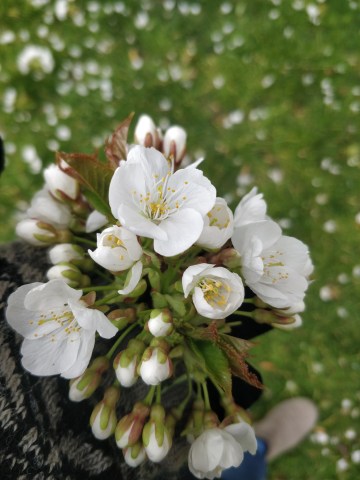Adventures in…. Estonia
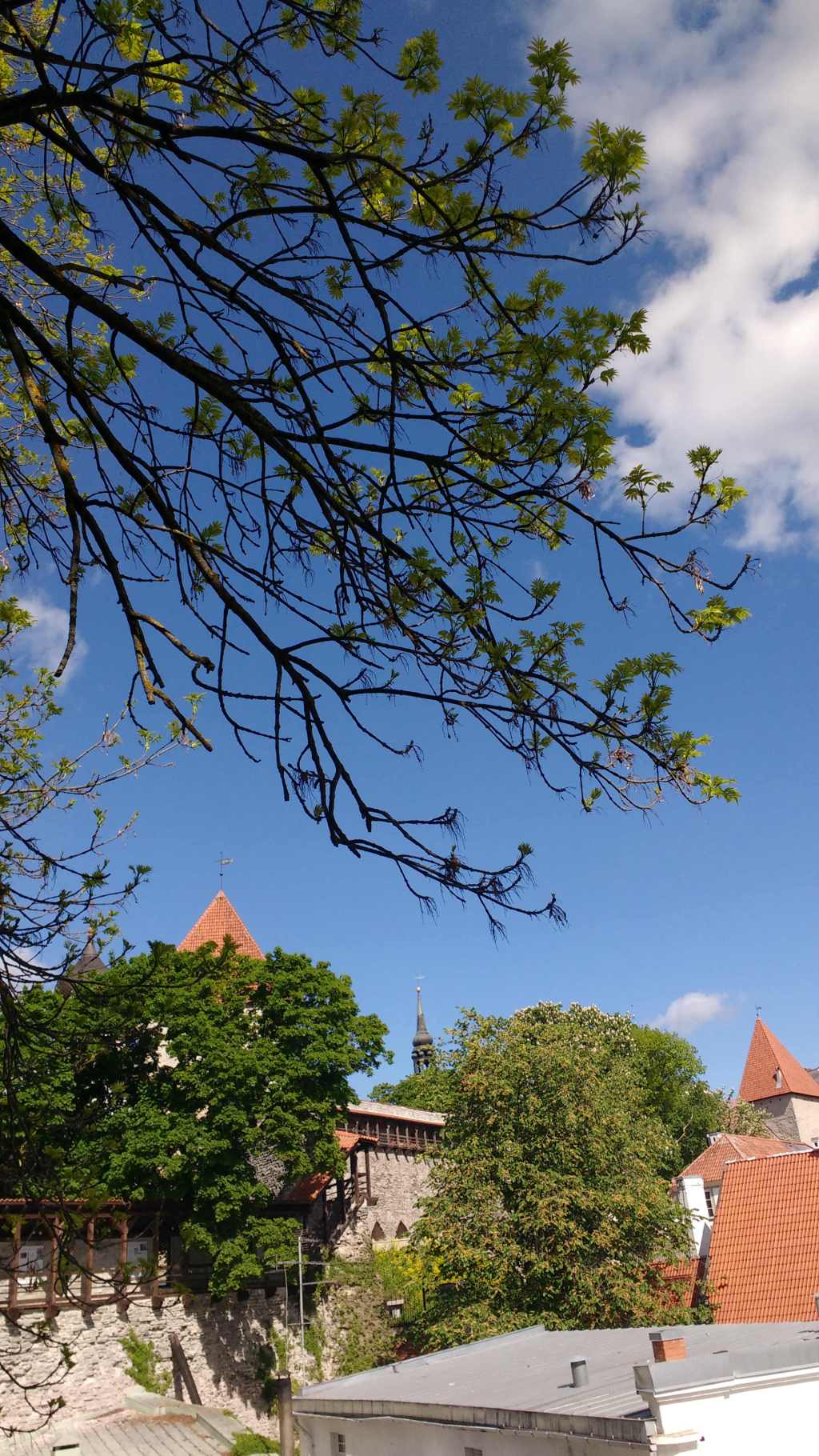
Why is whenever anyone asks me to go traveling I automatically assume it’s some terrible mistake? Why, for example, would anyone invite me to go to Estonia? It seems like madness….
… as it turns out, the madness of awesome.
In May 2016 I went to the Headread Festival in Tallinn. As prep I did the following:
- Bought some Euros
- Renewed my European Health Insurance Card
- Read about the history of Estonia (800 years of various occupying powers; brief flourishes of independence in the early 20th century; more occupation; liberation in 1990 and twenty five years of cultural and economic boom celebrating a history of Estonian language, music and culture that remarkably managed to both endure and flourish despite the afore-mentioned occupation)
- Tried to learn some Estonian.
Feckin’ hell, Estonian is not an easy language. I mean, maybe if you’re from Finland it’s a walk in the park, but to someone raised on a Latinate language, who’s only flourishes of adventure are into German and Chinese, Estonian is ridiculous. Or should that be… ridiicuuloous? For in Estonian there are many vowels.
Thankfully! Speaking Estonian turned out to be, at most, a hilarious half-hearted courtesy rather than remotely necessary, as nearly everyone I met wasn’t merely bi-lingual, but spoke three or four languages with casual ease. Even the kids were terrifying multilingual; I met a dozen teenagers who not merely spoke English fluently, but could express themselves as passionate, intelligent, erudite humanitarians in it, and who frankly gave me hope for the future.
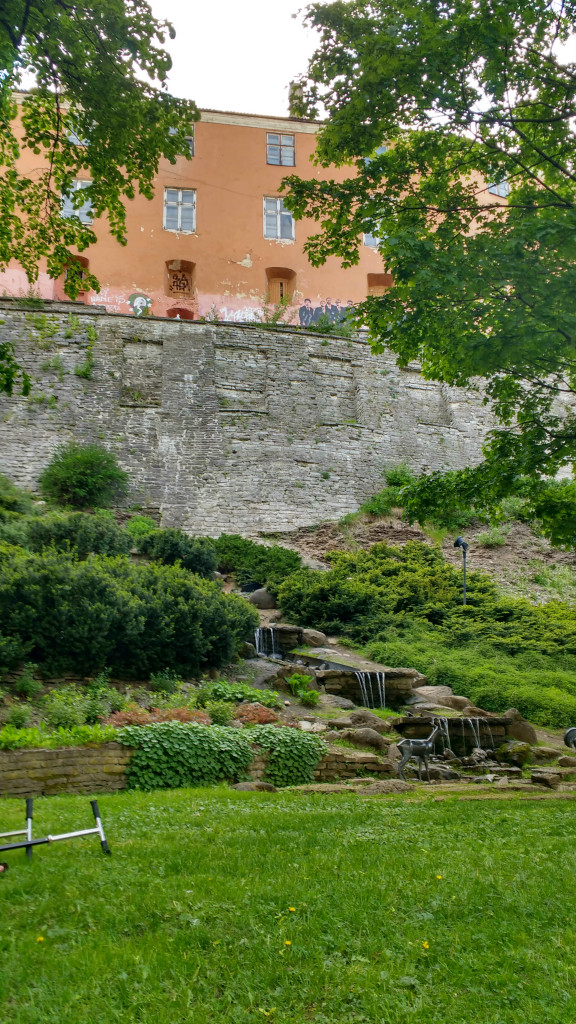
I flew to Tallinn via Helsinki. The plane was delayed by 30 minutes. We were roared onto it by the steward hollaring ‘we have to go now or we’ll miss our take-off slot!’ and lo, the second we were all seated, we missed the take-off slot. Given that my turnaround in Helsinki was scheduled to be 45 minutes long, and we were now down to 15 minutes, I was a little anxious. It is possible that this anxiety was what prevented me from realising, twenty minutes before landing, that I needed to pee. By the time this was a thing, the toilet was shut, and we were descending. We arrived at gate 30, and the Tallinn flight was from gate 31… I stepped out of the plane amid a scurry of sweating commuters looking for their connection, and could see the next gate, right there but oh no… not simple. For Britain is not in the Schengen Zone, which meant rather than walk the two yards to the next gate, it was a mad, bladder-shaking run from gate 30 to Finnish customs, through security, back round the side of the airport, down an endless corridor of shut shops, to gate 31 where the plane was already boarding. No time to pee, but that’s fine… there’d be a toilet on the plane, right?
Not so much. The flight from Helsinki is 35 minutes. Of those 35 minutes, 15 minutes are spent taxiying down the runway at either end. That’s 20 minutes in the air, or to put it another way, you could fart your way across that sea and it’s definitely not enough time to open the toilets. As I wondered how much of this was really my own fault, a stern stewardess sat at the front of the aisle, unmoving, unblinking, a single black leather glove on her left hand, scrutinizing us all like a teacher waiting to see which child will pick its nose first. When someone tried to stand while the seatbelt sign was on, she snarled him into submission before his knees had even locked upright. “DO NOT STAND!”
Tallinn airport welcomes you with the words “Estonia: Positively Surprising!” I wish to offer the hypothesis that this is the greatest motto ever.
What with everything running behind, and knowing that there were people waiting to meet me the other side of customs, I belted through the airport as fast as my legs could carry me. I had no luggage to collect, it was nearly one in the morning, there indeed was the welcoming committee, which was excellent, I felt the beginning of hope within….
“We are waiting for two more people to come off your flight,” explained the gentleman who’d organised it all, flawlessly, may I add. “We shall wait here.”
I managed not to faint on the spot, looking around for an entirely absent toilet, as we waited for the next two guests to arrive. They had checked-in baggage; that took fifteen minutes. Then two of their friends had come out at 1 a.m. specially to meet them, old friends, there was hugging, chatting, planning, swapping of numbers… don’t get me wrong, it was touching. It was delightful. AND I STILL HADN’T HAD A CHANCE TO PEE.
We drove to the hotel, which thankfully wasn’t far. On arrival the receptionist was occupied with a half-French, half-Greek gentleman there for work, who’s keycard had stopped working. I managed not to cry like a child, counting backwards steadily from one hundred as he did his business, got his keycard and we, slowly, so very slowly, checked in.
“Do you have a credit card…” began the receptionist to me.
“No!” barked our organiser. “They pay for nothing!”
The receptionist cowered beneath his mighty power, and so did I. At 2 a.m. I ran into my room and may I say what a lovely bathroom it was.
I mean, don’t get me wrong, the entire hotel was lovely, but it had been hard to focus on much else until that point… I crawled into bed, and five hours later (I feel that something may have happened with time zones too, but by this point I didn’t care) my alarm went off.
Day One began with breakfast. I know this sounds trivial, but I am still enough of a scruffy student that if someone offers me unlimited free breakfast, I will eat EVERYTHING. It turns out this was a tactical error, for later in my welcome pack I discovered that as well as a book of English/Estonian poetry and a bottle of Estonian liquor, I’d been given lunch vouchers which somehow, between all the breakfast and canopes, I never got round to using, thus missing out something silly. Harsh world…
Breakfast was delicious; a mixture of fry up, smoked salmon, pastries, salad and fruit, depending on your inclination. Only one great absence: for the first three days, I couldn’t find any tomato ketchup.
“What do you mean, no ketchup?” demanded my partner, as I skyped in later that day – skype also being an Estonian invention, it turns out. “What are you saying?”
Later, he googled Estonian cuisine. “Are you aware they have fourteen different types of condensed milk? FOURTEEN? You need to find out what they all are.”
I was too busy being royally fed and treated like a princess to investigate this further; the mystery remains.
At 8.45 a.m. we got on a coach to go and explore a bit of Estonia. By we I mean approximately 40/50 writers, including guests from Russia, Ukraine, Latvia, Sweden, Switzerland, Tanzania, the USA and Britain. As we drove, our hosts told us about Estonian history and culture – including the sense of privacy that many Estonians value. A country which is at least 45% dense forest, villages will often appear out of no where, they said, hidden by all the trees. Even where there are villages, the houses tend to be built fairly apart, so you need not intrude upon each other. The forests were both a place of sanctuary and fear for Estonians; during times of violence people could flee to them for shelter, but they were also a place from which bandits and fighters could come.
We were also treated to a sample of folk music by the ridiculously talented Veronica, who’s children were also helping out extensively with the festival and were also horrendously talented in their own rights. She sang beautifully, and told us of the structure of folk music, a call and response pattern to help in the learning of the songs. She also offered this explanation of some of the longer folk music song cycles….
“For the first five minutes of the song, I think people are very interested, they are enjoying it, engaged. Then at ten minutes they begin to despair, as they realise that this isn’t going to end, and by fifteen minutes they are falling asleep or wish they were dead. But I think at twenty minutes it can become hypnotic again, a trance-like thing, and by half an hour they might almost be mesmerised into enjoying it again.”
The coach ride out of Tallinn was one of my first opportunities to really look out of the window at the country. The city itself has a beautiful, early-modern and heavily restored heart, full of tourists but lovely none-the-less. Outside you have a ring of late twentieth-century capitalism; glassy shopping centres, endless globalised brands, the swanky port and big, growling main roads. A little bit beyond that you have properly communist suburbs; isolated towers falling apart in treeless, blasted landscapes, industrial grot and sprawling iron rooftops. The beginning of the forest is a relief after all the cleared flatlands, and as you head towards the coast and the road begins to wind, somewhat like the folk music Veronica described, the monotony of the forest becomes a richly engaging, hypnotic thing.
We drove to the coast, to a town where the writer’s union of Estonia had a house that looked down onto a black-rock bay. There was no denying the beauty of the place; isolated bright houses, millpond water onto dark stones, a distant, grey-blue shore covered in sky. We were treated to an Estonian feast for lunch, allowed to wander along the muddy/sandy shore, and then gently mustered back again onto the bus to travel to an Estonian winery.
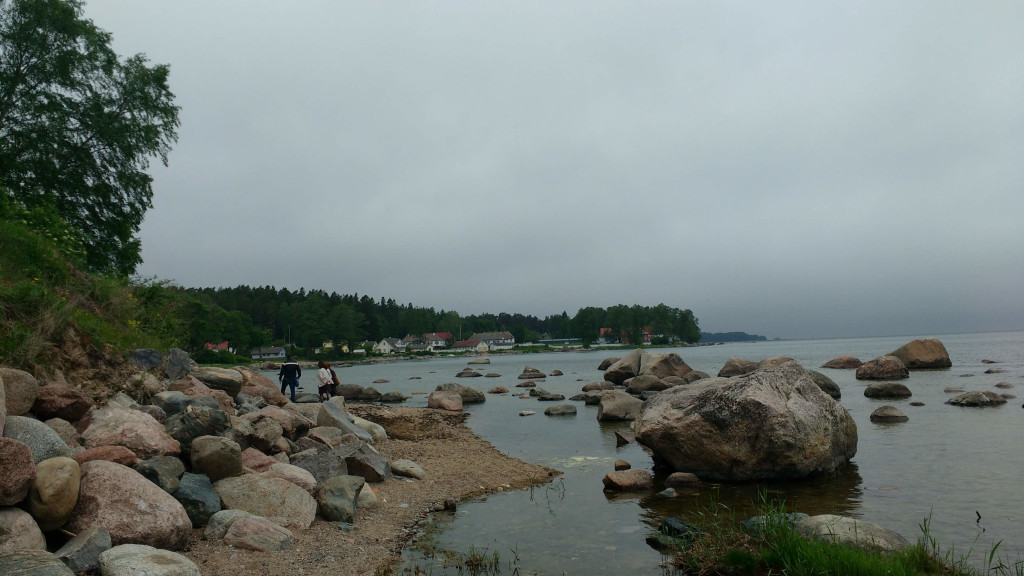
Estonian winery? Grapes in this northern climate…?
Ah, no – not grapes! Fruit wines. Our host took us onto a curve of grass that rolled down to a river, showed us the berries she grew to ferment, told us of the many ingredients – aleo vera, dandelion, blackberry, gooseberry etc. – that she ferments into her vintage, sat us down for a tasting, explained how as well as being a wine maker, she also kept an eye on the fast-flowing waters that ran down through the village, and which were popular with the canoists. “In the morning, first you go save the drowning people,” she explained, “Then you make the wine.”
In the empty streets outside, a dog lounged, the wind blew through the trees, a yellow digger sat silently by a cleared patch of land. Wine was tasted, with a British poet remarkably doing very well at guessing from where its ingredients had come, before, happy, full and a little tipsy, chased by casually enthused mosquitoes, the writers climbed back on the coach and headed towards Tallinn.
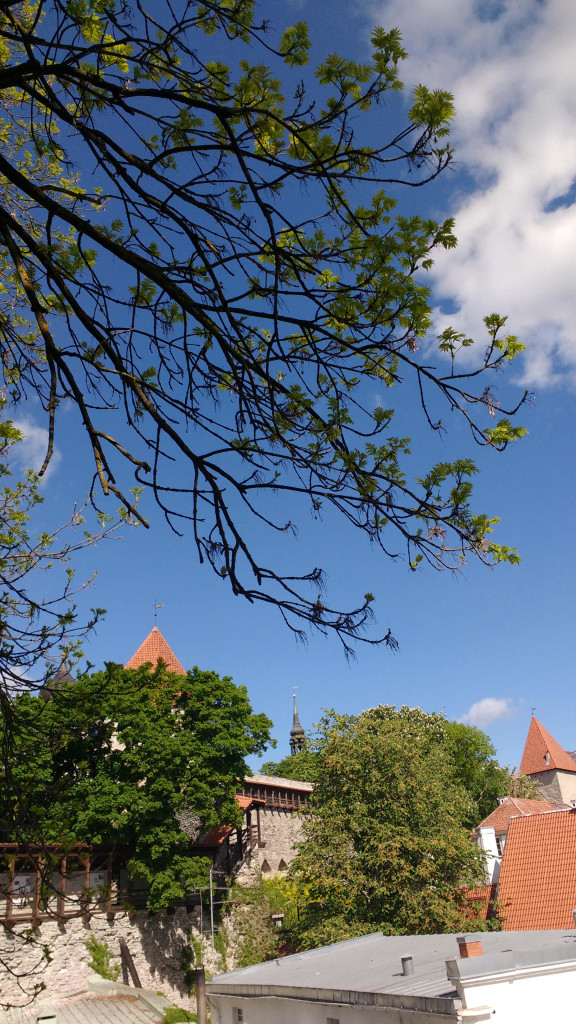
Estonia has a population a bit over a million people. As a result, according to the French translator I sat next to on the trip back, everything about it was ‘cute’. The Headread Festival was perhaps also cute to him, but I couldn’t help but be impressed by the scale of it – not merely the guestlist, but the TV cameras recording it, the simultaneous translations from a variety of different languages, the live stream onto a huge screen outside the main venue, the sheer organisational plunk of it. Returning to Tallinn I knew I had an appointment to go talk to the local YA fantasy group, and no sooner had I put my shoes on than a fourteen-year-old guide, Sarli, was downstairs to collect me and show me the way, apologisingly fluently all the way for her excellent English.
My talk was in the Tallinn Children Literature Centre, which is basically a building I wish I’d grown up in, every room a celebration of books, language and childhood. As I’ve already mentioned, the kids were horrifically erudite and clever, and no sooner was that done than I headed off to the opening event of the Festival in the Town Hall. The door was opened by a man in a long black cloak who managed to retain a straight face under all circumstances, and as seemed appropriate the opening speeches were in English and Estonian, before being followed up by a song in Russian composed by a Lithuanian performed by a Ukranian. If you hadn’t got a sense of the tenor of this event by now, that should probably have sealed the deal….
I dined on canopes. If you think you can’t live on canopes, you haven’t eaten enough. Staggering home, I was bewildered by how bright it was at 10 p.m., and sat flicking through TV channels, watching an endless series of Canadian dramas dubbed into French with German subtitles. I went to sleep late, with the EU flag flying above the roof of the hotel.
Day Two commenced with a guided tour of the city, which to my shame I was too tired and footloose to fully appreciate. However, at the start of the tour I’d heard the guide say that the hosts had specifically asked the tour to focus on Estonian culture, rather than just the touristy bits of the old town, and as such it would be going to the Song Festival Arena. I’d read about this – every five or so years, Tallinn hosts a Song Festival, in which thousands of performers and hundreds of thousands of people come together to sing and celebrate music in a way which seemed to be one of the most incredibly moving and important cultural acts of the country. As a result, with a rather lo-res map in my pocket, I set out to try and find it by myself.
This was a hit-and-miss affair. For a start, I had left the compass that usually is clipped to my front door keys behind in England in the name of travelling light, and my ability to find North by merely the time and the sun was a little bit thrown by the fact that the sun was hitting these compass points at different times from what I was used to in Blighty. After a bit of wobbling, and nearly accidentally boarding a ferry to Helsinki, I found myself on the northern shoreline of the town, not really sure where I was but with a sense that it was all going to be alright really. For a while I sat and watched the ferries come and go – fifteen minutes after one left the harbour, its wake would wash up on shore, breaking in white foam against the rocks – before I wandered on. My map, it turned out, also lacked a scale, and so I’d underestimated how far I’d be walking. I found a monument to Russian soldiers, which briefly helped nail my location, but after failing to find a way into the park on the other side of the main road, I settled on a distant spike overlooking the bay as a likely place for a song festival. It had all the tick boxes, as far as I could tell – fantastic location, commanding presence and height, roughly in the right direction – and so I walked along the shore beneath a cloudless sky until I reached it, and climbed a concrete ramp wide enough for a military parade, alone and a little befuddled, wondering what I’d see on the other side.
What I saw was a military cemetery, honouring the soldiers of all sides, including Germans from World War Two, quiet and grassy and neatly maintained above the sea. The present’s relationship with history it is constantly changing, but such places as the cemetery are correct and good, regardless of how you look at the past. I sat down on the stone benches as the insects buzzed, and tried again to work out where I was. I had overshot the Song Festival Arena by nearly a mile, turned out, and now had to wiggle back. With a shrug of ‘screw it’ I picked a more-or-less random path that I thought might help me return in roughly the right way, and began the walk back towards the town centre.
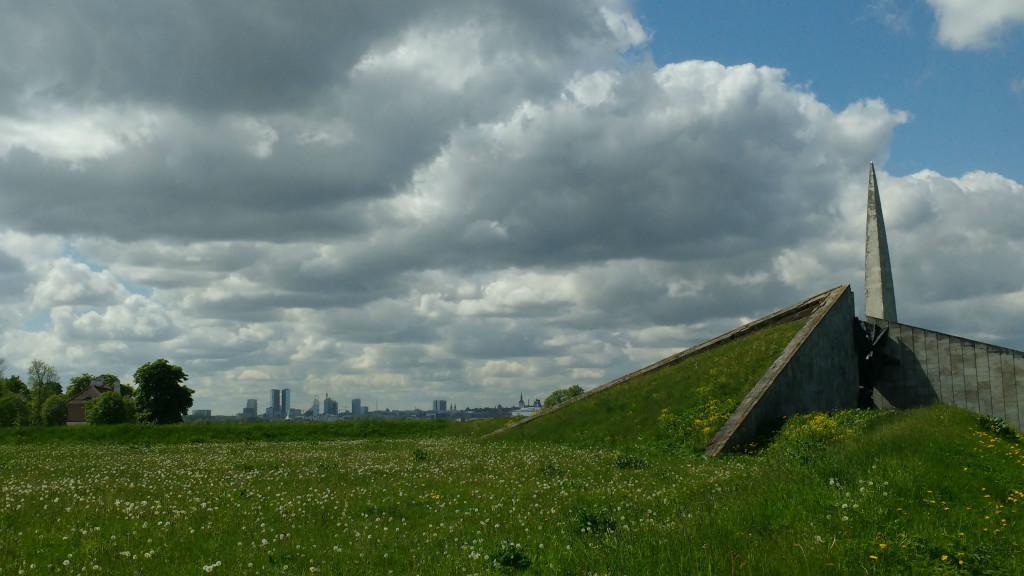
The path wiggled up a steep hill, down which a single cyclist had the best time just letting himself go, thick trees on all sides. At the top it broadened out into a sort of wild park, where the old couples and the women with prams wandered. Though definitely not on my map, this seemed an excellent thing – old couples and women with prams are a sign of a real city, to me, a place where people live, rather than just tourism. Wandering along, I passed a series of bright wooden houses away from the world, back walls onto gardens that had no access to a main road, and a picture of Chuck Norris which I didn’t have the Estonian to fully understand, before sweeping onto a main road and finding, to my surprise, the Song Festival Arena just right there.
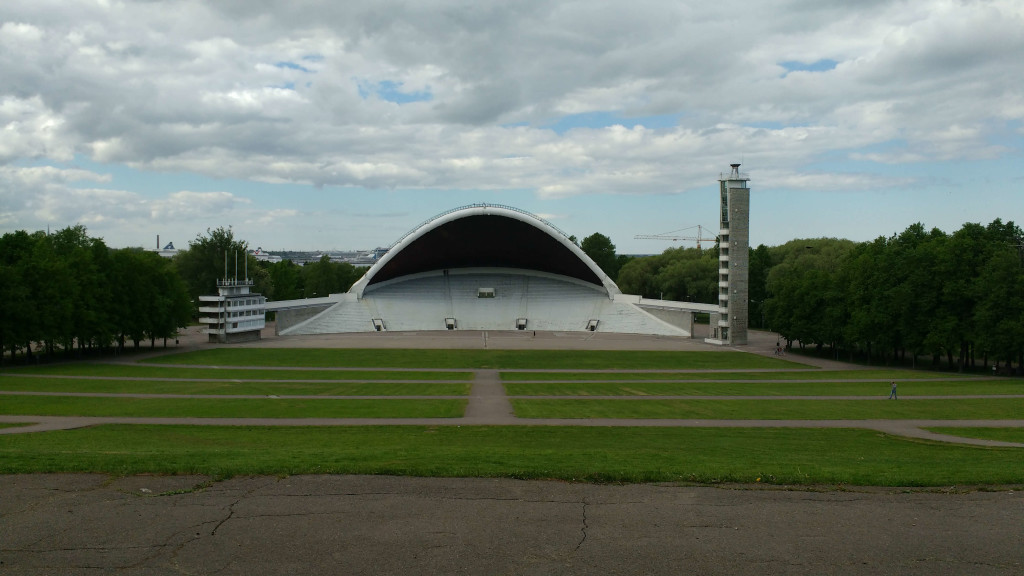
Well damnit, having come this far, I went inside. It’s hard to get a sense of scale without walking a place, but the entire thing swept down from a hill to a white arch, surrounded by control towers, where tens of thousands could gather to make music. Appropriately, as I arrived, a group of women had snuck out of the bushes to surprise one of their number, waiting alone, with an Estonian version of happy birthday – same tune we know and love, different words. Children on a school trip ran up and down the slopes, and it was only their presence, and a sense that I might have to look respectable later and didn’t have many clothes (just airplane hand-luggage), that stopped me from just doing a rolly-polly all the way to the bottom, possibly while shouting ‘wheeeeee!’
Now back on my local map, I wandered out the other side and into Kadriorg Park. Again – the scale on my map lied. After half an hour of wandering through a Japanese zen garden, up through great, rustling trees, through fields of thigh-high grass, past hunting lodges and ice cream shops, around the tennis courts and down towards the athletic fields, I had a feeling I might maybe be reaching an edge? Maybe?
By now the afternoon was definitely creeping on. I resisted the temptation to buy all the pizza, and followed a main road that could have been in any city in Europe – the Chinese takeaway, supermarkets, cheap phone shops etc. – back through the city. Parks popped up every now and then, full of children playing in the sun, and by the time I got back to the hotel my legs were distinctly unimpressed with my navigational skills.
After a bit of flaking out, I wandered into the Old Town. There was, of all things, a reception at the Irish Ambassador’s house that evening, and I spent the intervening time sat in a cafe that sold itself as the ‘oldest cafe in Tallinn’ and had been recommended by the previous day’s teenage guide, eating cake and doing HSK1 Chinese listening papers. (My attempts to learn Estonian had essentially been abandoned by now.) The cafe was lovely, the cake was delicious, the music was a series of Christmas jazz hits. I told the waitress this on my way out, just in case she hadn’t clocked it; she shrugged. So the world turns.
So. A reception at the Irish Ambassador’s house. Of course. I have never been to an embassy before; the word is that in Tallinn you can pretty much knock on the door of any embassy, and odds are the ambassador will invite you in for whisky. Certainly this felt the case in the Irish Ambassador’s house, where we were treated to more music and excellent food, as well as a great many pints of Guinness, which seemed to hold a great deal of cultural significance for the diplomatic staff, and was met with confusion by a great many guests. I attempted to spread discord, as a good Brit, but alas diplomats turn out to be diplomatic. Having already spent two days answering questions about the impending British EU referendum vote, I called it a night, and headed back down the hill of the old town, towards bed.
Day Three.
I attended talks by other writers, mostly because there were finally some that day in English. The admiration I experienced for writers such as Dave Hutchinson was merely reinforced by meeting him, and nearly all the speakers were erudite experts, passionate performers, creative and brilliant. However, I am a technician as well as a writer, and my tolerance for writers talking about where their ideas come from and what their working day is like can wear thin fairly fast, so the day oscillated between wandering, reading and listening. I went looking for a present for my partner – as a wood carver I thought he might appreciate some of the carved souvenirs on sale – but alas, the more I looked the more I felt he’d be judgmental about the choice of chisel, or something of that ilk, so wussed out. I encountered my first truly obnoxious family of Brits on holiday and was reassured that the world was as it should be, and the evening was concluded with a feast of food in the restaurant next to the Writer’s Union, conversations about culture and people and words and literature that left me kinda buzzing with respect for the intelligence and thoughtfulness of the people round the dinner table, followed by an apologetic half hour in the hotel’s basement gym to jog off all the pork. (I never use a gym ever, but hell, it was there….)
Day Four was my last day, and began with an interview which rapidly shifted from being question and answer to an excellent and interesting chat about pretty much everything, including if not especially the genius of Roger Zelazny. By the time we wound down, it was time to go to the centre of town and do my hour’s worth of knattering with Kaisa Kier, one of the organisers and moving forces of the entire event. At some point in the coming months, you can probably find the whole thing online, if you’re interested. I’m not a huge fan of writers just talking about their own books – everyone writes in different ways, finds their ideas in different places and that’s fine and groovy, but I sorta feel there’s more interesting things to be poked at about how ideas are constructed and people and words and shit, which god bless her, Kaisa was all over like a rash. Another one of those cases where I kinda felt grateful to people making me sound more clever with their words than I think I am. (I feel the same way about Peter Kenny’s readings of all the Claire North books – definitely makes them sound better out loud than I think they are on the page.)
From the event it was a mad dash to the airport, having this time cunningly been to the toilet in advance, and as I sat in Helsinki airport I reflected on a) how much more pleasant it was than Heathrow and b) how sad it was that this was technically my first time ever in Finland, and I still hadn’t seen any reindeer.
I guess maybe travel doesn’t always erase these cultural cliches after all.
At home, I was asked what Estonia was like. And I guess the answer is, as always, in two parts…
Of course, it’s not like home. The language, the manners, the landscape, the history and how it shaped the present, the architecture, the ways in which culture is expressed – inevitably it has its own unique and beautiful identity.
And of course it’s just like anywhere in the world. This isn’t merely because of globalism, which has absolutely done its thing in Estonian – all the ipads, the shops, the Euro, the government, the relationship between society and commerce. Sure, yes, whatever. But also it’s just like anywhere in the world because if Headread showed anything, it’s that books and words translate across all cultures, and people and people who can be bought together and speak both common linguistics, but also a common human language of thought and feeling, that transcends national boundaries.
These two things – individual identity and shared humanity – are not incompatible. Having a cultural or national identity does not need to be defined by a negative, or reject the identities of others. And more than anything, I think I will associate Tallinn with this thought, and praise the organisers of the festival for celebrating, not merely words, but the power of words to transcend any barrier.

